- Home
- Franklin Horton
The Borrowed World (Book 4): No Time For Mourning Page 5
The Borrowed World (Book 4): No Time For Mourning Read online
Page 5
Randi stood and shouldered her pack. “I am not a hobo!”
“Yeah, Mom, do you have a bottle of Wild Irish Rose in your pack?” Sherry piped in, joking, though with an edge of the anger she always carried.
“I brought you girls into this world and I can take you out of it,” Randi warned.
The girls laughed and shook their heads.
“I don’t think you all should be pushing her,” Tommy said. “Now that you’re too big to spank, your momma will probably have to kick your asses, and she’d do it. She’s tough too. She’s kicked mine once or twice.”
The girls grumbled and started walking off in the direction of home.
Tommy walked over to Randi and slung a concerned arm over her shoulder. He was probably a foot and a half taller than her. “Honey, do we need to get you some counseling?”
“No, damn it!” Randi spat. “It’s just that being here is stressing me out.” She emphasized here by stabbing an angry finger at the cluster of houses.
“Well, why didn’t you say so?” Tommy said. He reached into his back pocket, pulled out a flask, and held it out to her. “Southern Comfort.”
She frowned but took it, tossing back a swig before returning the bottle to him. “Thanks. I needed that.”
“At least it will wash the taste of bum slobber out of your mouth.” He grinned and patted her on the back. “Any time, little sister. Now let’s catch up with them girls.”
“What about their dad?” she asked as they started walking.
“Gone,” Tommy said, taking his own swig off the bottle before replacing it in his back pocket. “Neighbor woman said that he took off about three days ago with some of his drinking buddies. They said they were going to someone’s hunting cabin over in Bland County.”
“Walking?” Randi asked.
“Nope. Had a pickup truck full of shit.”
Randi had nothing to say to that.
“You still sweet on him?” Tommy teased.
Randi stared coldly at her brother, then raised the tail of her shirt, exposing the wooden grip of an Old Hickory butcher knife shoved into her belt. “I grabbed this out of the kitchen this morning. If I could have gotten him alone, out of the sight of those girls, I was going to end it. I was going to stick it in his belly and watch him die slow.”
Tommy resumed walking, Randi falling back into step beside him. “You were always a tough woman, Randi. Now you’re a hard woman too.”
“It’s the only way to survive,” she said. “This isn’t the same world anymore. It’s just not.”
Chapter 8
Randi
Randi and her companions were exhausted by the time they neared her dad’s farm. They’d finished what water they had and were parched. The day had been hot and everything they drank had leached back out through their pores. Randi’s exhilaration at her nicotine relapse had turned to nausea when she realized that she’d probably sucked down a few too many of the old stale butts while sitting on the tracks. That feeling, along with the tiredness and dehydration had put her in a nasty mood.
“I hope Dad’s okay,” Carla said. The remark was aimed at her sister. They were walking ahead of Randi and Tommy though within earshot. Conversation had ground to a halt a while back. Everyone was too tired to talk.
“He’s fine,” Sherry assured her. “He’s tough. He’ll be okay.”
“Yeah, he’s like a fucking cockroach, girls,” Randi said. “He’ll be fine. No matter what he does he lands on his feet. Wrecks homes, wrecks marriages, leaves other people to clean up all the damage, and he still comes out smelling like a rose.”
“Don’t be bitter, Mom,” Carla said.
“Oh, honey, I am bitter,” Randi said sarcastically. “Let me give you an example of how bitter I am. There are times that I wish I could turn into a zombie so I could watch the look of terror in your dad’s eyes while I ate him alive. I know being a zombie would suck in every other way, but that one thing would make it all worthwhile.”
“Hell hath no fury,” Tommy said, shaking his head in amusement.
“Clearly,” Sherry agreed.
They hadn’t got much further when Carla started sniffing the air. “Smells like smoke.”
“It’s probably Mom,” Sherry said.
Randi frowned. “It’s not me. It’s probably somebody cooking.”
“I don’t think so,” Tommy said. “You can smell plastic in it. Smells like burning trash.”
No one wanted to voice the obvious concern. They were getting close to their own home now and there weren’t many houses around them. It made them all nervous and they picked up the pace.
In a few minutes they went around a bend in the road and the narrow valley opened up some. They could see sky. They could see smoke. The smoke was clearly coming from their farm.
“Son-of-a-bitch,” Tommy said, taking off running.
The girls and Randi were not far behind. Sherry was crying already. Randi was kicking into mommy-mode, assuring her that it would be okay, that everyone would be fine.
They reached the gate to their road. Tommy had cleared it already, dropping his pack as he ran toward their home, now fully engulfed in flames. Sherry screamed. Carla burst into tears. They all climbed the locked gate and took off running after Tommy.
Sherry was screaming the names of her children. She and Carla were pulling ahead of Randi, who was cursing her age, her condition, and her years of smoking. She still thought everything would be okay. Somehow someone had accidentally set the house on fire. Maybe it was cooking on the camping stove. Maybe it was a candle. They were okay, though. She knew it. Until she heard Tommy’s howl of pain and rage.
“NOOOOOOOOOO!!!!”
Randi ran faster. Carla was yelling now, Sherry screaming. Carla was pulling at her sister and tried to run toward the house, run into the house.
Randi reached the yard, saw her children struggling with each other. Saw Tommy holding their mother in his arms. She was covered in blood. It didn’t make sense. Burns didn’t kill you from blood loss. Why was there so much blood?
Something snapped in Randi’s overloaded brain. She had to take control. She had to calm down. She reached her daughters as Sherry broke loose from Carla and lunged toward the burning house. Randi grabbed her daughter by the arm and pulled her around facing her. Sherry was hysterical.
“Shut the hell up,” Randi hissed.
Sherry tried to pull loose again and Randi slapped her this time. “Look around the house. You can’t go in there. No one could be alive in there. They could be around back.”
Randi turned to Carla. “Take her! You two look around the other side of the house.”
She ran to Tommy, still holding their mother. When she got closer she saw the ragged holes in her mother’s face and neck.
“Fucking shotgun!” he said. “Somebody shot Mommy!”
“We’ve got to find everyone else,” she said. “We can’t help her. Get up and help.”
There was another scream. Carla or Sherry. Randi took off running. Tommy lay his mother gently on the ground, pulling his shirt off and draping it over her face. Then he was on the run.
In the side yard, Randi found her daughters on their knees beside another body. Her father. Her father. She couldn’t let that inside now.
No grandbabies, she kept telling herself. They could still be alive.
She crouched over her father, clinically touched his neck, and detected no pulse. Her poor daddy was a ragged thing. Bloody and shot multiple times with a shotgun too.
“He’s dead,” she said. “Keep looking.”
Her daughters looked at her in disbelief.
“Keep looking!” she yelled.
Tommy came around the corner just then, sliding in the grass. “Jesus no!”
“You go that way!” Randi yelled to her brother, pointing down the trail to the spring. It was a trail the children traveled often enough that they might be comfortable running in that direction if they’d had the opportunity to f
lee.
Randi pointed at Sherry and Carla. “You check the barn. Go!”
The girls took off running, wiping tears from their cheeks, smearing their grandparents’ blood on their faces. Randi pulled her pistol from her waistband and began circling the house. She made a complete circle and found no more bodies. She looked at the burning house, trying to imagine what might have happened.
She went back to her father’s body, trying not to look at it. He was in the side yard, where the trail came from the spring. If someone had come to the house this way, he would have confronted them. What would her mom have done? She wouldn’t have come outside to fight. She wouldn’t have left the kids, would she?
She went back to her mother’s body. She looked at the house. Through the flames she could tell that the back door was open. Maybe her mother had run? Randi got as close to the house as she could. In the distance, she could hear the faint sounds of her daughters calling for her grandchildren. With her back to the house, she imagined her mother running out the door and looked for places she might have gone.
The barn may have been too far if there were people near the house. They might have bushwacked their way up the hillside, scrambling through the weeds, though that would not be easy going. There were too many blackberry vines and wild rose bushes. Then in the weeds, she noticed the old coal bin nearly overgrown with kudzu. It had been there so long that it had become part of the landscape. She’d seen it so many times that she didn’t even notice it anymore. With the vines engulfing it, perhaps no one else would have noticed it either.
She checked the chamber of her pistol and verified there was a round ready. She raised the pistol in front of her, gripping it with both hands in the manner that Gary had shown her on their way home from Richmond. She walked softly through the tall grass.
The coal bin was made of old poplar boards, assembled when they were still green. The roof was rusty tin. A door made of boards covered the entrance, hanging from strap hinges.
Randi stood at that door, her heart pounding. She took her left hand from the gun and grasped the wooden door handle. She pulled gently, her finger easing into the trigger guard of the pistol and resting lightly on the trigger. The hinges groaned and it took some effort to pull the door open. She swung it to the side, letting it open completely until it rested against the siding of the coal bin.
It was too dark inside to see anything, especially with her eyes adjusted to the bright daylight. She stuck her head in and still couldn’t see. She raised a foot and stepped into the high opening. The ceiling was low and she could not stand upright. She waited for her eyes to adjust. There was more light closer to the door. In the far recesses, the boards blackened by decades of coal blended seamlessly with the shadows. Then she saw a pale disturbance in the darkness.
It was still. There was no movement at all. Her heart froze. She lowered the gun, tucked it into her back pocket and sank to her knees. She reached out, touched the body and found it warm. Feeling around, she found that it was not just one body but three small ones. They stirred.
Randi sobbed involuntarily. She took the children into her arms and tried to crawl out with them. She couldn’t carry them all at one time, so she lifted them one at a time, walked on her knees, and deposited each grimy child into the blinding sunlight. They were still waking up, shading their eyes.
She carried the last child out the door and then crawled out herself. Her brother and daughters were there and they all wept, cradling the grimy children.
Tommy met her eye. “They killed Jeff too.”
With a surge of pain all of the loss hit Randi, but she had no tears left. All she felt was a burning rage. They would figure out who did this and she would make them pay.
Chapter 9
Wallace County
Don, the driver of the truck, and his co-pilot Hodge knew where the Glenwall golf course was even though neither had ever been there before. There would have been no conceivable reason the two would have ever ventured onto its grounds prior to the terror attacks. It was a completely alien place full of alien people with concerns that would have sounded ridiculous to the two farm hands. It wasn’t that the two men felt inferior; in fact, it was the opposite. They didn’t think the people there knew much about the real world and that was to their detriment. The fact that they were relying on men like the two of them for something so basic as a delivery of food further demonstrated that point in their eyes.
“You add up everything you and I have ever earned and we still couldn’t afford the cheapest house in this damn place,” Don commented. “Ain’t that some shit?”
Hodge slept most of the way over, a consequence of drinking so early in the day. He was hoping to find a way to get some more booze because he was nearly out. If things got really bad, he had a bottle of Lysol tucked away in his bedroom closet. He hated to resort to it because it burned his stomach something awful. If he mixed it with water in a gallon jug it would hopefully keep the shakes away until he could find something better.
Although he hadn’t paid a lot of attention to what Don was saying he nodded anyway. That was what he usually did. Besides staying drunk, agreeing with Don was one of his primary responsibilities during the day.
“They’re welcome to the damn place,” Hodge said. “Not sure I’d live here if they was to give me a house for free.”
“I might,” Don said. “I’d do it just to keep them all pissed off. I’d run up a rebel flag and keep chickens and goats. I’d pee wherever I felt like and I’d keep at least two junk cars parked in the yard. They’d fucking hate me.”
Hodge chuckled, low and slow.
Don maneuvered the big rig onto the entrance road and was forced to stop. Two Wallace County Sheriff’s Department cruisers were parked nose-to-nose blocking the road. Four men were visible behind the cars. They wore civilian clothing, jeans and t-shirts, and had on body armor. Their black pistol belts were packed with utility pouches and other gear. The men all had military-style rifles that Don couldn’t identify though that wasn’t as important as the fact that they were all leveled at him.
He put the truck in park and killed the loud diesel engine. It was nearly impossible to talk over. He kept his hands on the wheel in plain sight and leaned out the window. “Got a load of cattle,” he called out. “Supposed to see a fellow named Baxter.”
One of the group spoke to the other three, then came around the vehicles. He kept his rifle leveled on the cab of the truck as he passed. He looked in the trailer and saw that it was indeed packed with cattle.
“They’re good,” the man called to his buddies.
Another, still behind the vehicles, spoke into his radio, then listened to the response. “Mr. Baxter is on his way,” he called out.
The man who’d checked the trailer approached the cab. “If you gentlemen have weapons, you’ll have to leave them here at the gate.”
“We ain’t got nothing,” Don said.
He looked surprised by that. “Well, if you’re going to be making this trip very often you may want to carry something,” he said. “You wouldn’t catch me on the road without a gun. It ain’t safe out there anymore. People are crazy.”
“I’ll keep that in mind,” Don said.
A golf cart came zipping up to the roadblock driven by an overweight man in black military fatigues wearing dark sunglasses. There was a patch on the shoulder of his jacket that read Campus Security. In the passenger seat was a taller man wearing a tan safari jacket and a black cap with the letters WCEM on it. When the golf cart lurched to a stop, the man in the safari jacket swung out and approached the truck. Another in black fatigues got out too and stood by the cart. He was tall and had a shaved head.
Don opened the door, climbed out, and stuck out a hand. “My name’s Don. I was told you was buying cattle.”
The man in the safari jacket eagerly shook hands with Don. “I’m John Baxter, Director of Wallace County Emergency Management. We’re glad to see you.”
“I heard from a
buddy that you all were buying cattle. My friend and I have access to quite a few. We thought we’d come over and see if what we heard was true.”
“Oh, it’s true,” Baxter said. “I’ve got folks willing to pay top dollar for beef and about any other food in quantity. We can provide fuel and pay you in cash.”
“That’s what I heard. How much a head for the cattle?” Don asked.
Baxter named a figure. Don couldn’t conceal his grin.
“I think we can do business,” Don said. “Where do you want the cattle?”
Baxter said to one of the security men working the gate, “Can you escort our new friend to the tennis courts?”
The guard ran around to the passenger side of Don’s truck. He pulled open the door and climbed in beside a frowning Hodge. He and Don rode in this truck together all day every day and he wasn’t used to having to share it. The seat was molded to him. It seemed to have some special magnetic properties that held him in place no matter how tired or drunk he was.
“I’ll get your cash and meet you at the tennis courts,” Baxter said.
Don climbed into the truck and started the engine. The remaining security guards backed the cars out of the way and Don drove through the roadblock. He turned to the guard riding shotgun to ask him what direction to take and noticed the odd look on his face.
“Something wrong?” Don asked.
“Damn right,” he spat. “This old fucker stinks.”
“Reckon I’ve got used to it,” Don said. “Which way?”
He gestured toward a side street and the tennis courts beyond where there was a lone cow wandering the tennis courts, corralled by the high fences. “That’s good thinking right there. They ain’t got no grass though.”
“We have grain but they don’t stay alive long enough to worry too much about it,” the guard replied.
“Go through a lot of beef?” Don asked.
“There’s a lot of folks here. A lot of people like my buddies and I that work here. They probably go through a cow a day. What they don’t eat they can trade for other things they need.”

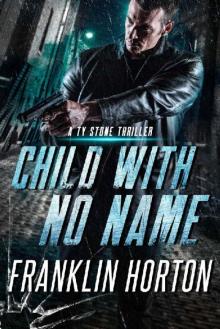 Child With No Name
Child With No Name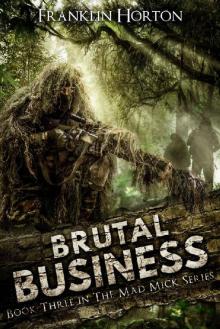 Brutal Business: Book Three in the Mad Mick Series
Brutal Business: Book Three in the Mad Mick Series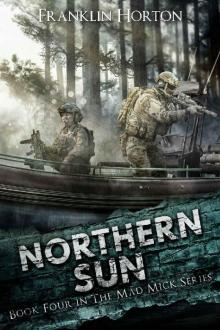 Northern Sun: Book Four in The Mad Mick Series
Northern Sun: Book Four in The Mad Mick Series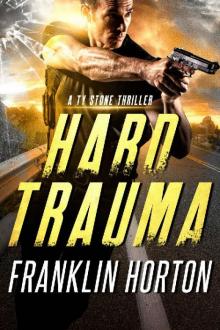 Hard Trauma
Hard Trauma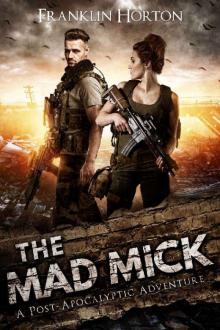 The Mad Mick: Book One of The Mad Mick Series
The Mad Mick: Book One of The Mad Mick Series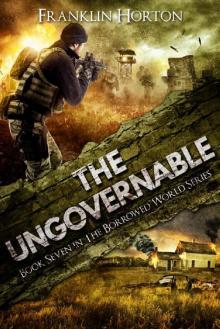 The Ungovernable
The Ungovernable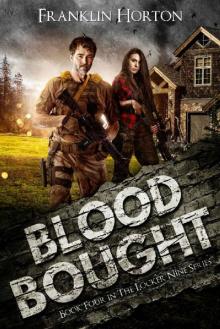 Blood Bought: Book Four in The Locker Nine Series
Blood Bought: Book Four in The Locker Nine Series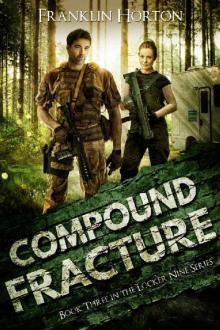 Compound Fracture
Compound Fracture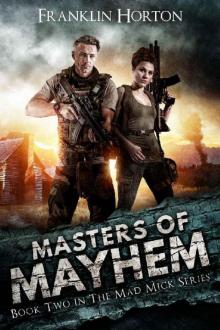 Masters of Mayhem
Masters of Mayhem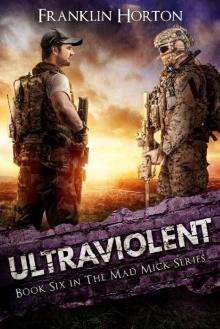 Ultraviolent: Book Six in The Mad Mick Series
Ultraviolent: Book Six in The Mad Mick Series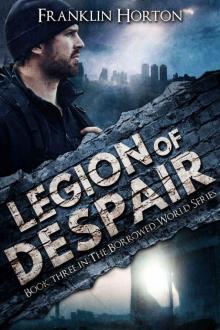 The Borrowed World (Book 3): Legion of Despair
The Borrowed World (Book 3): Legion of Despair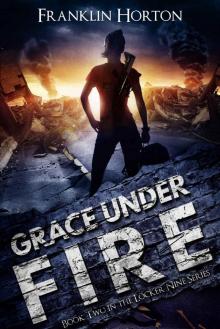 Grace Under Fire: Book Two In The Locker Nine Series
Grace Under Fire: Book Two In The Locker Nine Series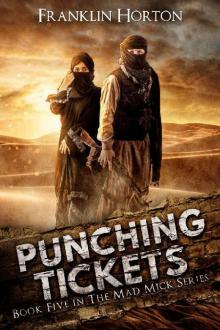 Punching Tickets: Book Five in The Mad Mick Series
Punching Tickets: Book Five in The Mad Mick Series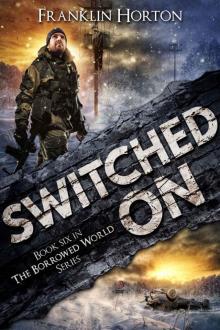 Switched On: Book Six in The Borrowed World Series
Switched On: Book Six in The Borrowed World Series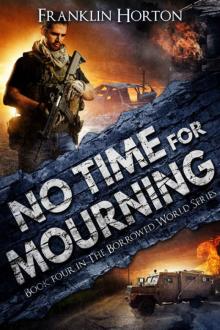 No Time For Mourning: Book Four in The Borrowed World Series
No Time For Mourning: Book Four in The Borrowed World Series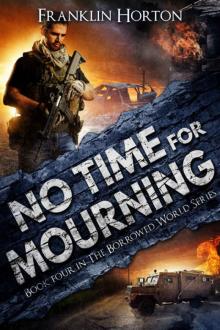 The Borrowed World (Book 4): No Time For Mourning
The Borrowed World (Book 4): No Time For Mourning Random Acts
Random Acts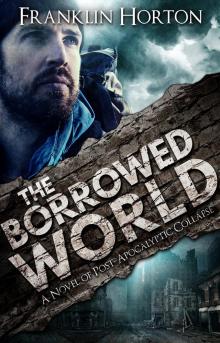 The Borrowed World: A Novel of Post-Apocalyptic Collapse
The Borrowed World: A Novel of Post-Apocalyptic Collapse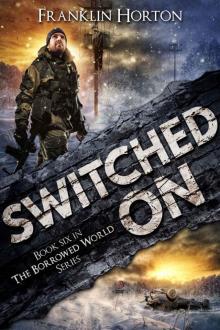 Switched On
Switched On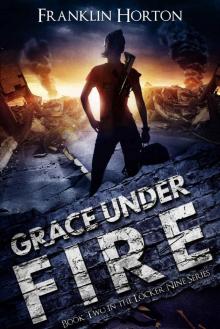 Grace Under Fire
Grace Under Fire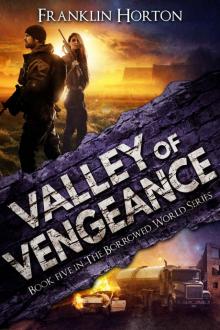 Valley of Vengeance: Book Five in The Borrowed World Series
Valley of Vengeance: Book Five in The Borrowed World Series